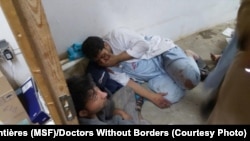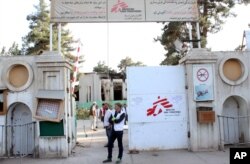Medecins Sans Frontiers (MSF) reopened a small medical clinic in Kunduz, Afghanistan, Saturday, their first facility there since the American airstrikes that destroyed a hospital in 2015.
“The opening of this clinic is the first step toward providing more medical assistance in Kunduz,” Silvia Dallatomasina, head of programs for MSF in Afghanistan, told Reuters. “And for us it’s an important step.”
Since the air attack by American special forces in 2015, which killed 42 patients, medical staff, and caregivers at the MSF trauma center, the medical aid group has been trying to secure assurances from American and Afghan military officials that their medical facilities would be respected and protected.
“We are still finalizing commitments but we believe we were able to reach an agreement,” Dallatomasina said.
The new clinic in Kunduz, which is not situated at the site of the destroyed hospital, will only provide outpatient treatment of minor or chronic injuries, she said.
Patients who need more advanced care including X-rays will still need to go to the government-run regional hospital, which has been overworked amid heavy fighting in the province.
“The regional hospital is quite overwhelmed, so we want to try to reduce that burden by treating less serious injuries,” Dallatomasina said.
While no final plans have been confirmed, MSF hopes to begin building a new trauma center in Kunduz as early as 2018, although likely on a smaller scale than the previous facility, she said.
The MSF trauma center was destroyed during a period in 2015 when Taliban militants briefly overran the city. An American military probe concluded that the attack was the result of human error and equipment failure, among other factors.
At least sixteen U.S. military personnel were disciplined for their role, but MSF has criticized the lack of independent investigation into the incident.
While Afghan troops, still backed by U.S. warplanes and special forces, have prevented the Taliban from seizing the city again, fighting has continued.
“The security in Kunduz is still quite volatile, and we know that the needs are really dire,” Dallatomasina said.






